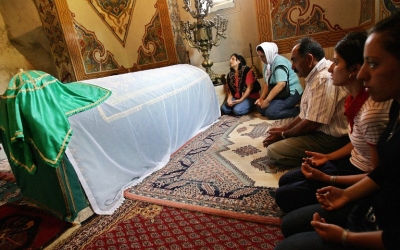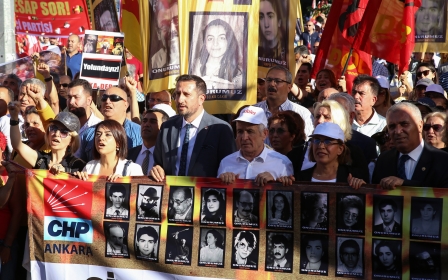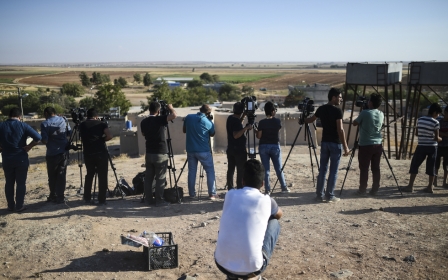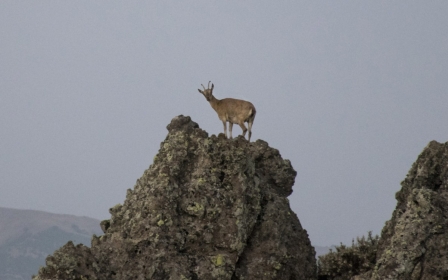Turkey: Erdogan’s Alevi reform initiative met with praise and scepticism
An initiative announced by Turkish President Recep Tayyip Erdogan last week, with the declared aim of empowering the country's Alevi citizens, has triggered mixed reactions within the community.
The plan, according to government statements, seeks to resolve some of the lingering problems of the Alevi community by establishing a new state institute to provide funding and staff for their places of worship, known as cemevi.
"Under this scheme, Alevism will be treated as a cultural rather than a religious belief with practising followers," Ayfer Karakaya-Stump, an academic at William and Mary University in Williamsburg, US, who has been studying the religious community’s history, told Middle East Eye.
"Alevis don’t want the state to rule them. They want to be granted equal rights,” she said.
Yet, the Turkish government is proudly promoting the initiative, ahead of elections scheduled to be held next June.
New MEE newsletter: Jerusalem Dispatch
Sign up to get the latest insights and analysis on Israel-Palestine, alongside Turkey Unpacked and other MEE newsletters
“I believe that this is one of the most significant reform attempts in our history,” Erdogan said, adding that a group of experts visited 1,585 cemevis, and "noted the problems and difficulties that Alevis face.”
Who are the Alevis?
Alevism is a religious belief in which Prophet Muhammad’s son-in-law Ali and his descendants are regarded as sacred. Like Shia Muslims, they adhere to Twelve Imams as the sole and rightful representative of Islam, rejecting the legitimacy of the caliphates during the Umayyads, Abbasids and even the Ottomans.
Karakaya-Stump, also a member of the community, defines Alevism as an esoteric religious belief with a close affinity to Sufism, marking its difference from Shias.
'Alevis don’t want the state to rule them. They want to be granted equal rights'
- Ayfer Karakaya-Stump, Alevi academic
Estimates of the size of the Alevi population in Turkey vary between 10 and 20 million; they are considered the second largest religious group after the Sunni Muslim majority.
Under the "ocak" (saintly lineage group) system in which Alevi "dedes" (Turkish for elders) head the community, Alevis believe that the rightful leaders should be descended from Prophet Muhammad only.
Karakaya-Stump explained that most Alevis do not perform the main mandatory rituals of Islam, such as the five prayers or Ramadan fast. Instead, Alevism carries out "cem", in which men and women perform folkloric religious songs. The place where "cem" is held is called a cemevi.
Karakaya-Stump stated that the vast majority of Alevis today live secular lives and consider Alevism primarily as a cultural rather than religious affiliation.
The latest reform package promises that the Alevi-Bektasi Culture and Cemevi Presidency within the culture ministry will be responsible for cemevi construction, paying bills, maintaining educational and other religious activities, organising conferences, panels and seminars related to Alevism studies, in addition to promoting Alevism studies at universities and other research institutions.
The new entity will have one president and 10 members, who might be either Alevis or people familiar with Alevism. It will also pay salaries to the elders if they want it.
In August, Erdogan, for the first time in 20 years, visited a cemevi in Ankara, dining with the elders on the occasion of a religious duty. Later that same month, again for the first time, he joined a commemoration ceremony for an Alevi sufi, Haci Bektasi Veli, reiterating his support for the community.
Hailing the government as a promoter of religious freedom, Lutfi Elvan, a former minister, claimed last year that “some 80 to 90 percent of all cemevis in the country were built during the successive AK Party [Justice and Development Party] governments since 2002.”
'Suppressing Alevis'
Erdogan’s statements have caused different reactions within the Alevi community, which lacks unified leadership, with hundreds of dedes who rule their own communities.
Cuma Erce, head of Pir Sultan Abdal Cultural Association, said in a statement that “this [reform] package is another phase in suppressing Alevis by the hand of the state. Our problem is not paying the bills or receiving aid from the state budget.
"The president reduces Alevism to the level of a cultural colour in the society and to a minor part of Sunnism.”
'Disunity makes it more difficult to make progress rapidly. The state is looking for a more substantial representation and rhetoric from the Alevi side'
- Necdet Subasi, an academic
Mehmet Ali Ayyildiz, who has publicly supported Erdogan’s moves towards the Alevi community, noted that they maintain their demands to be granted equal citizenship, for an official recognition of cemevis as houses of worship, to eliminate discrimination against Alevis in government jobs, and to abolish compulsory religious classes in schools.
In August, Turkish Interior Minister Suleyman Soylu told local media that his ministry has begun to promote citizens with Alevi faith to senior positions such as district governorships, governor offices and police chiefs.
Necdet Subasi, an academic known for his works on Alevism in the modern era, told MEE that the recent reform package would be mutually beneficial.
“Alevis have rightful demands. It is good that the state is giving an ear to them. There must be more dialogue,” he said. Subasi was formerly a senior adviser on Alevi issues to the government.
That said, “disunity makes it more difficult to make progress rapidly. The state is looking for a more substantial representation and rhetoric from the Alevi side,” Subasi noted.
However, Karakaya disagreed with Subasi, saying that, “Alevis’ demands are clear, regardless of their relationship with the government or each other. The most important demands are the recognition of cemevis as houses of worship and the abolition of compulsory religious classes at schools.”
Karakaya believes that the Alevi question must be handled in terms of human rights and liberties rather than as a religious issue. She also finds it strange that “a secular state builds cemevi. Why? Or, why does the state create a board to rule the cemevis?”
Mehmet Sarigol, an Alevi citizen from the city of Malatya, told MEE that not only European-based Alevis, but also other Alevi leaders regardless of their political inclination were working for their own interests.
“We, the Alevis, demand recognition as equal citizens who have their own understanding of Islam. We don’t want to be financed by the state. Nor do we want to have close ties with any political party. We just don't want to be disparaged, murdered, or regarded as inferior to others or infidels,” he said.
A history of persecution
Subasi said that besides the historical roots, Turkey’s modernisation also triggered the Alevi question since millions of Alevis migrated to mostly Alevi-free cities from their mostly Sunni-free villages from the 1960s onwards. According to him, a solution to the Alevi question will take place gradually.
Karakaya agreed with Subasi on the point that the cemevis were in the cities as a result of urbanisation. “But," she said, “do you know why Alevis had to build them? Because Sunni imams refused to hold funerals for Alevis in the mosques,” underlining the social tensions between the two communities in the country.
Throughout Turkey’s modern history since the foundation of the republic in 1923, Alevis faced attacks by both mobs and the Turkish army, resulting in the death of thousands.
In 1937, the Turkish army launched a deadly operation in the eastern Tunceli city - then Dersim - following a rebellion by an Alevi leader, Seyyit Riza. According to state archives, 13,806 people were killed. Erdogan issued an apology in 2013 on behalf of the state.
In Kahramanmaras and Malatya, in 1978, at least 128 Alevis were killed by ultra-nationalist mobs while the northern city of Corum witnessed the killing of 58 Alevis in 1980 following a rift between leftist and conservative groups.
Another deadly incident occurred in the central Turkish city of Sivas in 1993 when 33 Alevi people, most of whom were writers, novelists or musicians, were burned alive at Madimak hotel during the commemoration of Pir Sultan Abdal, a legendary Alevi poet who was executed in 1590 by an Ottoman pasha.
Alevis have long been asking the government to turn the hotel into a museum. However, the government made it a science and cultural centre in 2011, imprinting the names of the victims at the entrance. Still, the Alevi community insists on their demand that it become a museum.
This article is available in French on Middle East Eye French edition.
Middle East Eye delivers independent and unrivalled coverage and analysis of the Middle East, North Africa and beyond. To learn more about republishing this content and the associated fees, please fill out this form. More about MEE can be found here.





